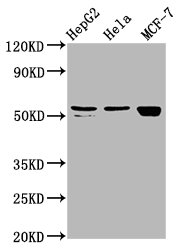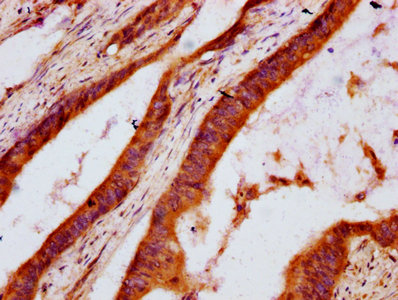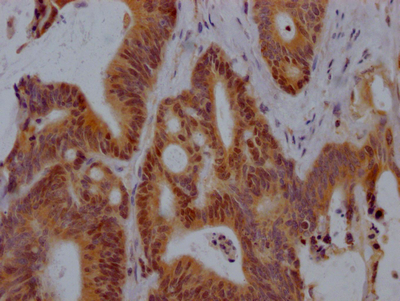DHCR7 Antibody
-
货号:CSB-PA006844LA01HU
-
规格:¥440
-
促销:
-
图片:
-
Western Blot
Positive WB detected in: HepG2 whole cell lysate, Hela whole cell lysate, MCF-7 whole cell lysate
All lanes: DHCR7 antibody at 2.4µg/ml
Secondary
Goat polyclonal to rabbit IgG at 1/50000 dilution
Predicted band size: 55 kDa
Observed band size: 55 kDa -
IHC image of CSB-PA006844LA01HU diluted at 1:600 and staining in paraffin-embedded human colon cancer performed on a Leica BondTM system. After dewaxing and hydration, antigen retrieval was mediated by high pressure in a citrate buffer (pH 6.0). Section was blocked with 10% normal goat serum 30min at RT. Then primary antibody (1% BSA) was incubated at 4°C overnight. The primary is detected by a biotinylated secondary antibody and visualized using an HRP conjugated SP system.
-
-
其他:
产品详情
-
产品名称:Rabbit anti-Homo sapiens (Human) DHCR7 Polyclonal antibody
-
Uniprot No.:Q9UBM7
-
基因名:DHCR7
-
别名:DHCR7; D7SR; 7-dehydrocholesterol reductase; 7-DHC reductase; Delta7-sterol reductase; Sterol Delta(7-reductase; Sterol reductase SR-2
-
宿主:Rabbit
-
反应种属:Human
-
免疫原:Recombinant Human 7-dehydrocholesterol reductase protein (63-147AA)
-
免疫原种属:Homo sapiens (Human)
-
标记方式:Non-conjugated
本页面中的产品,DHCR7 Antibody (CSB-PA006844LA01HU),的标记方式是Non-conjugated。对于DHCR7 Antibody,我们还提供其他标记。见下表:
-
克隆类型:Polyclonal
-
抗体亚型:IgG
-
纯化方式:>95%, Protein G purified
-
浓度:It differs from different batches. Please contact us to confirm it.
-
保存缓冲液:Preservative: 0.03% Proclin 300
Constituents: 50% Glycerol, 0.01M PBS, pH 7.4 -
产品提供形式:Liquid
-
应用范围:ELISA, WB, IHC
-
推荐稀释比:
Application Recommended Dilution WB 1:500-1:5000 IHC 1:500-1:1000 -
Protocols:
-
储存条件:Upon receipt, store at -20°C or -80°C. Avoid repeated freeze.
-
货期:Basically, we can dispatch the products out in 1-3 working days after receiving your orders. Delivery time maybe differs from different purchasing way or location, please kindly consult your local distributors for specific delivery time.
相关产品
靶点详情
-
功能:7-dehydrocholesterol reductase of the cholesterol biosynthetic pathway reducing the C7-C8 double bond of cholesta-5,7-dien-3beta-ol (7-dehydrocholesterol/7-DHC) and cholesta-5,7,24-trien-3beta-ol, two intermediates in that pathway.
-
基因功能参考文献:
- aim of this study was to determine the association between single nucleotide polymorphisms (SNPs) of PNPLA3 (rs738409), COX-2 (rs689465) and DHCR7 (rs12785878) and advanced liver fibrosis in Thai patients PMID: 30139224
- pathogenic mutations in DHCR7 protein are located either within the transmembrane region or are near the ligand-binding site, and are highly conserved among species. PMID: 29300326
- The DHCR7 polymorphism may be a pre-treatment predictive marker for response to PEG-IFN-based therapy in chronic HCV genotype 1 infection. PMID: 28415985
- phosphorylation modulates DHCR7 activity in cells, and contributes to the overall synthesis of cholesterol, and probably vitamin D PMID: 27520299
- Allelic variations in CYP2R1 and GC affect vitamin D levels, but variant alleles on VDR and DHCR7 were not correlated with vitamin D deficiency. PMID: 26038244
- Review: DHCR7 activity should be considered during drug development and prenatal toxicity assessment. PMID: 27401223
- In this study, we demonstrate that the prevalent c.964-1G>C Dhcr7 mutation perturbs SMO cilia localization and SHH pathway activation as a consequence of reduced cholesterol biosynthesis PMID: 26685159
- these findings highlight DHCR7 as an important regulatory switch between cholesterol and vitamin D synthesis. PMID: 26887953
- The aim of this study was to investigate the association of three polymorphisms in the GC gene (rs7041 and rs4588) and CYP2R1 gene (rs10741657) on 25-(OH) VD serum concentration among Jordanians. PMID: 26383826
- This study shows that Smith-Lemli-Opitz Syndrome patients who are heterozygous/homozygous for one pathogenic mutation and only one parent carrying that mutation are candidates for DHCR7 gene (partial) deletions. PMID: 25040602
- Polymorphisms in CYP2R1-rs10766197 and DHCR7/NADSYN1-rs12785878 are associated with vitamin D deficiency in Uygur and Kazak ethnic populations PMID: 26149120
- physical and functional interaction between DHCR24 and DHCR7 PMID: 25637936
- In this mendelian randomisation study, we generated an allele score (25[OH]D synthesis score) based on variants of genes that affect 25(OH)D synthesis or substrate availability (CYP2R1 and DHCR7) PMID: 24974252
- rs3829251 (DHCR7) influenced progression of subclinical atherosclerosis in a manner dependent on type 2 diabetes status but independent of 25(OH)D levels. The SNP modulates DHCR7 mRNA levels in aortic adventitia. PMID: 24663808
- NADSYN1/DHCR7 locus (rs12785878 and rs1790349) polymorphisms have an effect on plasma 25-hydroxyvitamin D levels and coronary artery disease incidence PMID: 24642724
- This study provides evidence that the DHCR7 gene is involved in the susceptibility to ocular Behcet disease. PMID: 24184224
- Data indicate that SNPs in the DHCR7/NADSYN1 locus showed evidence of positive association with rheumatoid arthritis (RA). PMID: 23636220
- Data indicate that the same nucleotide polymorphisms (SNPs) genotypes of CYP2R1, GC and DHCR7 that are associated with reduced 25(OH)D3 serum levels were found to be associated with hepatitis C virus (HCV)-related hepatocellular carcinoma (HCC). PMID: 23734184
- In patients with genotype 1 chronic hepatitis C, GG homozygosis for DHCR7 gene and lower 25-hydroxyvitamin D levels are independently associated with the severity of liver fibrosis. PMID: 23730842
- Studies suggest DHCR7 mutation for the diagnosis of Smith-Lemli-Opitz Syndrome. PMID: 23321614
- Genetic variation in DHCR7 associated with lower serum 25(OH)D has a decreased risk of aggressive prostate cancer. PMID: 23377224
- The p.Thr93Met is the most frequent mutation in Turkish SLOS patients showing that there might be a founder in East Mediterranean regions PMID: 22211794
- Our study is the first to confirm the association of variants in DHCR7 and CYP2R1 with 25(OH)-vitamin D levels in patients with chronic liver diseases. Results also showed an association between DHCR7 and liver stiffness. PMID: 22576297
- we found that the two variant genotypes of DHCR7/NADSYN1 (rs3829251, rs12785878) were both associated with serum 25-hydroxyvitamin D levels. PMID: 22801813
- Two previously reported N287K (861 C>A) and R352Q (1055 G>A) and a novel R352L (1055 G>T) mutations were identified in the DHCR7 gene in these patients. PMID: 21696385
- ANKRD55 and DHCR7 are novel multiple sclerosis risk loci. PMID: 22130326
- several SNPs related to calcium metabolism are associated with height, in particular rs3829251 at the DHCR7/NADSYN1 gene. PMID: 22390397
- This study demonistrated that the accumulation of an immediate cholesterol precursor, 7-DHC and its oxysterol metabolite, 3beta,5alpha-dihydroxycholest-7-en-6-one (DHCEO)in DHCR7 knockout mice. PMID: 22182693
- GC and NADSYN1/DHCR7 loci individually and collectively contribute to variation in plasma vitamin D levels in Chinese Hans. PMID: 21972121
- Study confirms that variation in DHCR7 is associated with predisposition to autoimmune disease type 1 diabetes. PMID: 21441443
- Mutations of the 7-dehydrocholesterol reductase gene is associated with Smith-Lemli-Opitz syndrome. PMID: 20635399
- LBR mutant variants and sterol reductases can severely interfere with the regular organization of the nuclear envelope and the endoplasmic reticulum. PMID: 19940018
- The p.G366V is a novel mutation of the DHCR7 gene with guanine by thymine nucleotide exchange resulting in glycin by valin amino acid exchange in the dehydrocholesterol reductase enzyme. PMID: 19365639
- This protein catalyses the last step of endogenous cholesterol synthesis. SLOS is caused by a biochemical enzymatic defect. PMID: 11767235
- identified a new mutation in DHCR7 PMID: 11857552
- Mutation analysis demonstrated a novel mutation in the DHCR7 gene, present in homozygous form in the two affected individuals available for testing, and heterozygous in the parents. PMID: 12116246
- SLOS is a recessive gene disorder. A fetus was found to have renal agenesis. PMID: 12833423
- Our identification of a single haplotype associated with the T93M mutation in patients whose ancestors originate in the region of the Mediterranean Sea basin suggests a founder effect. PMID: 14981719
- DHCR7 mutations have a role in the Smith-Lemli-Opitz syndrome PMID: 15776424
- identification of nine novel missense mutations of the DHCR7 gene PMID: 15954111
- Mutational analysis of the DHCR7 gene led to the identification of seven distinct mutations, three of which are new (F174S, H301R, and Q98X) for Smith-Lemli-Opitz syndrome. PMID: 15979035
- In Polish individuals with SLOS two DHCR7 mutations, c.452G>A (p.Trp151X) and c.976G>T (p.Val326Leu), account for 65.2% of all observed DHCR7 mutations. PMID: 16497572
- DHCR7 mutation is a rapid and reliable method for prenatal diagnosis of Smith-Lemli-Opitz syndrome. PMID: 17441222
- DHCR7 gene mutations is associated with Smith-Lemli-Opitz syndrome. PMID: 17595012
- it appears that a combination of founder effects, recurrent mutations, and drift have shaped the present frequency distribution of DHCR7 mutations in Europe PMID: 17965227
- The study identified compound heterozygous mutations ([p.Arg352Trp] + [p.Lys376ArgfsX37]) in a Korean girl with clinical and laboratory features typical of Smith-Lemli-Opitz syndrome. PMID: 18006960
- DHCR7 mutation is associated with Smith-Lemli-Opitz syndrome PMID: 18249054
- study determined the mutational spectrum of DHCR7 gene in 17 Slovak Smith-Lemli-Opitz syndrome patients; 6 different mutations were identified: nonsense mutation W151X and missense mutations V326L, L109P, G410S, R352Q, Y432C PMID: 19390132
显示更多
收起更多
-
相关疾病:Smith-Lemli-Opitz syndrome (SLOS)
-
亚细胞定位:Endoplasmic reticulum membrane; Multi-pass membrane protein.
-
蛋白家族:ERG4/ERG24 family
-
组织特异性:Widely expressed. Most abundant in adrenal gland, liver, testis, and brain.
-
数据库链接:
HGNC: 2860
OMIM: 270400
KEGG: hsa:1717
STRING: 9606.ENSP00000347717
UniGene: Hs.503134
Most popular with customers
-
-
YWHAB Recombinant Monoclonal Antibody
Applications: ELISA, WB, IF, FC
Species Reactivity: Human, Mouse, Rat
-
-
-
-
-
-























